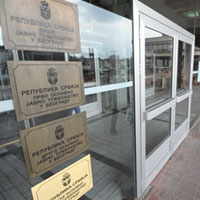Role of the State in hiding Ratko Mladić – State Secret

In response to a request from the Balkan Investigative Reporting Network (BIRN) to provide a copy of the indictment against 11 people for helping hide the then fugitive Ratko Mladic, the First Basic Public Prosecutor’s Office responded that the indictment had been declared a state secret and that the public could not be informed. The Humanitarian Law Center (HLC) considers that the decision to proclaim this document a state secret is illegal, and aimed at concealing the role of state organs in hiding war crimes indictees.
The indictment against 11 Mladic’s accomplices was raised in 2006, and the first-instance verdict was delivered before the First Basic Court in Belgrade in late 2010, when only one defendant was found guilty – for the illegal possession of weapons, nine were acquitted, and the first indictee, Jovo Đogo, had already passed away. The Court of Appeal in Belgrade returned the case for a retrial in May 2011, and on May 17 2016, the First Basic Court acquitted all 10 accused accomplices, on grounds of obsolescence. Finally, in August this year, the Court of Appeal issued a verdict which resulted in the release of nine of the accused for lack of evidence. Only Marko Lugonja, who acknowledged the crime he was charged with, was sentenced to a suspended sentence of six months in prison.
On May 20, 2016, in accordance with the Law on Free Access to Information of Public Importance, the HLC sent a request to the First Basic Court in Belgrade for the delivery of a judgment issued three days earlier in the repeated proceedings. On June 28, 2016, the First Basic Court submitted to the HLC the judgement on Mladic’s accomplices. Since the accused were relieved of their responsibility on grounds of obsolescence, in the reasoning it was only stated what the prosecution had in fact charged them with. In other words, from this publicly available document it can be understood why the indictment was declared a state secret.
The judgement states among other things that one of the accomplices, then a senior military leader in the VJ, was charged with “in the period from November 2000 to 25.7.2003, in Belgrade, at a military facility of the Yugoslav Army and the SCG Army in Topcider, as well as at other addresses in Belgrade hiding Ratko Mladic and helping him not to be found.” In addition, it is alleged that the same person was accused of “supplying food and other items from the command of the First Army of the Army of Yugoslavia” to Mladic and his security personnel instead of to soldiers. The judgement also states that the same man, according to the indictment, “with the written authorization of Ratko Mladic, made all his remittances through the Social Insurance Fund of military insurers” and gave them to Mladic’s wife.
The proclamation of a document as a state secret, by the Law on Data Secrecy, “is determined to prevent the creation of inextricably serious harm to the interests of the Republic of Serbia”, and the First Basic Public Prosecutor’s Office states that the public disclosure of the indictment’s allegations would lead to “the disadvantageous international position and status of the Republic of Serbia and its citizens “. The HLC stresses that such a reasoning is illegal. Namely, the claim that the disclosure of information about the hiding of Ratko Mladic would cause the most serious form of damage to Serbia, and the proclamation of the indictment to be at the highest level of a state secret, is evidently unjustified, since the International Court of Justice pronounced Serbia responsible for violating the convention about genocide precisely because of the hiding of Ratko Mladic 10 years ago.
Finally, even if there would be a danger of the occurrence of inextricably serious damage, which obviously is not the case, it would not be a danger sufficient for this information to be proclaimed a secret, since for such a reason the State would have to show that the interests of Serbia, which would be protected by the secrecy of the data, are greater from the right of the public to know the required information in the specific case (Article 8 of the Law). Bearing in mind that this information is related to the hiding of one of the most wanted Hague fugitives, and that Mladic’s hiding led to the conviction of the State for violation of the Genocide Convention and also jeopardized the process of Serbia’s European integrations, there can be little doubt that the public’s interest in knowing this information is clear, justified and unquestionably more important than the unlawful interests of the State.
The HLC wishes to remind the society that the Republic of Serbia continuously abuses and violates the Law on Secrecy of Public Information and the Law on Access to Information of Public Importance in order to hide the responsibility of state authorities and its members for war crimes and related processes. The HLC published this research in 2016, in its publication, “Access to Documents on Crimes against International Law in the Possession of Serbian Institutions: STATE SECRET STRONGER THAN RIGHT TO TRUTH”.
It is precisely by hiding and failing to disclose the role of the State in massive human rights violations in the past and in later assisting the perpetrators of the crimes, that the inextricably serious harm to the interests of the Republic of Serbia is inflicted, and its international reputation is jeopardized.Therefore, the HLC calls on the state authorities of Serbia to stop such practices, and to enable the transparency of court proceedings and public insight into the documentation related to the participation of political, military and police structures in crimes during and after the conflict in the territory of the former Yugoslavia.







